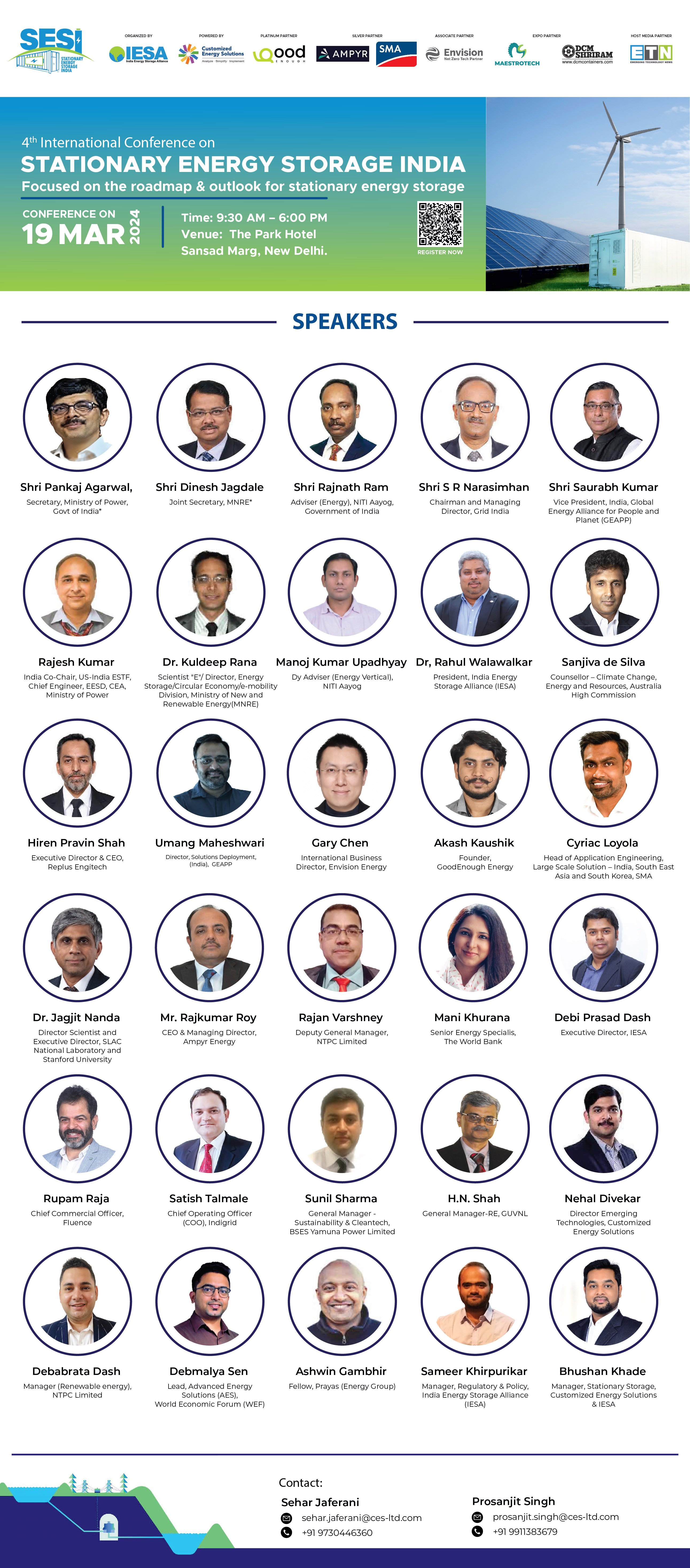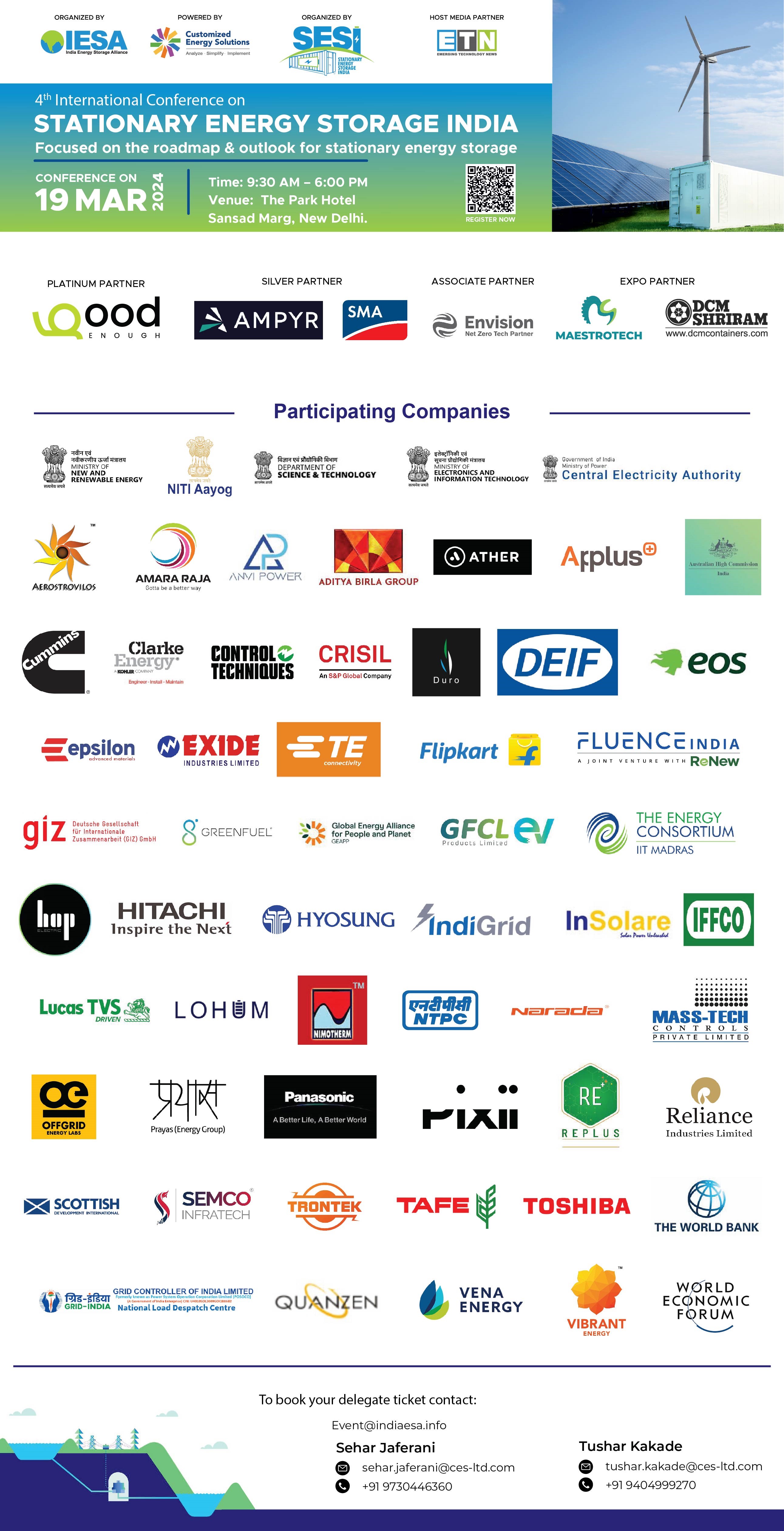Stationary Energy Storage India (SESI) - 2024
Integrating renewable energy in the power system is crucial for India to meet its climate goals. While initial capacities have been effectively integrated into the grid, the rising penetration of renewables in the energy mix is likely to result in system integration challenges due to the variable nature of RE and supply-demand mismatch.
Acknowledging the need to increase the storage component in the energy mix, the National Electricity Plan (NEP), projected that India will need an energy storage capacity of 16.13 GW (7.45 GW PSP and 8.68 GW BESS) with a storage capacity of 82.37 GWh (47.6 GWh from PSP and 34.72 GWh from BESS) by 2026-27. By the year 2031-32, the storage capacity demand is projected to increase to 73.93 GW (26.69 GW PSP and 47.24 GW BESS), with storage of 411.4 GWh (175.18 GWh from PSP and 236.22 GWh from BESS). Viability Gap Funding (VGF) scheme approved by the government for the development of 4,000 MWh Battery Energy Storage Systems (BESS) by 2030-31, with financial support of up to 40% of the capital cost as budgetary support, envisages an initial outlay of INR 9,400 crore, including budgetary support of INR 3,760 crore.
Further, the Ministry of New & Renewable Energy (MNRE) intends to invite bids for 50 GW of renewable energy capacity per year for the next five years, from FY 2023-24 to FY 2027-28. This potential creates an opportunity across the electricity ecosystem from distribution, transmission, and generation.
IESA has been working with central and state government departments to accelerate the growth of the energy storage sector in India. Under IESA’s Beyond Batteries Initiative, IESA is also working with alternate storage technologies like a flywheel, compressed air energy storage (CAES), gravity storage, thermal storage, and others for stationary applications. IESA has also contributed to shaping the requirements of energy storage policy for India which is expected to be finalized by the Ministry of Power very soon.
SECI, NTPC, SJVN, and states like Gujarat, Uttar Pradesh, Madhya Pradesh, and others have announced various tenders like Standalone ESS, Firm & Dispatchable RE, RE + Storage, and Peak Power. IESA is closely working with its member companies, energy storage technology providers, battery manufacturers, key renewable players, state nodal agencies and utilities, and tender authorities to develop an energy storage market.
In the view of above developments, IESA is delighted to announce the Stationary Energy Storage India (SESI) conference on 19th March 2024. The SESI conference will serve as a unique platform to interact, network, and learn about the stationary energy storage market landscape, government policies, new tenders, and the latest project updates.
Agenda
|
TIME (IST) |
SESSION |
|
09:30 – 10: 00 |
Registration |
|
10:00 – 10: 45 |
Inauguration – Policy Roadmap to Drive Stationary Energy Storage in India |
|
10:45 – 11:00 |
Networking Tea |
|
11:00 - 11:15 |
Energy Storage Projects and Tenders in India |
|
11:15 – 11:30 |
Large-scale Energy Storage Deployment in India |
|
11:30 – 11:45 |
Learning from Mega Scale Energy Storage Project Development in India |
|
11:45 – 12:00 |
Indigenously developed Battery Energy Storage System (BESS) for the Indian market |
|
12:00 – 12:15 |
Energy Storage Projects at Utility Level |
|
12:15 – 12:30 |
Energy Storage Requirement for DISCOMs |
|
12:30 – 12:45 |
State-level Project - RE plus Storage |
|
12:45 – 13:00 |
Pumped Storage Projects & Opportunities in India |
|
13:00 – 14:00 |
Networking Lunch |
|
14:00 – 14:15 |
Govt of India’s proposed ACC-PLI scheme focused on Stationary Energy Storage in India |
|
14:15 - 14:30 |
Non - Electrochemical storage (mechanical storage like Flywheel, CAES, gravity storage etc.) |
|
14:30 - 14:45 |
Energy storage for Peak shifting, and Urban Microgrid with DRE |
|
14:45 – 15:00 |
Energy Storage for Diesel Optimisation and Decarbonization of Commercial & Industrial Sectors |
|
15:00 – 15:15 |
Thermal Storage – for colling application |
|
15:15 – 15:30 |
Energy Storage for Railways, Telecom, and Datacentre |
|
15:30 – 15:45 |
Energy Storage Sizing & Technology Selection |
|
15:45 – 16:00 |
Unlocking Inverter Capabilities – Advanced Power Electronics for Safe and Stable Grids. |
|
16:00 – 17:15 |
Panel Discussion: Energy Storage to Achieve 500 GW of RE for India |
|
17:15 – 17:30 |
Key Takeaways and Closing Remarks |
|
17:30 – 18:00 |
Networking & Hi-Tea |


The Park Hotel, Sansad Marg, Hanuman Road Area, Connaught Place, New Delhi, Delhi, India



